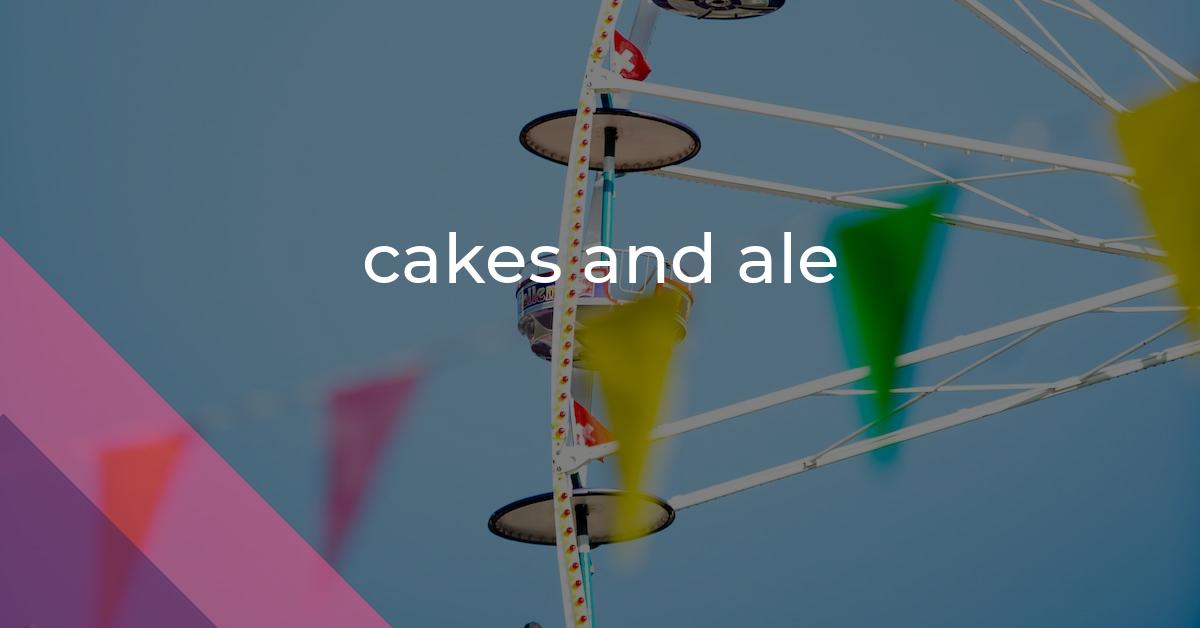cakes and ale: Idiom Meaning and Origin
What does ‘cakes and ale’ mean?
The idiom cakes and ale means to enjoy a luxurious and carefree life, prioritizing pleasure and indulgence over any serious matters or responsibilities.

Idiom Explorer
The idiom "live it up" means to enjoy oneself or have a good time, often by indulging in luxuries or exciting activities. It is often used to encourage someone to make the most of a particular situation or to have a memorable experience.
The idiom "eat one's cake and have it too" means wanting to consume something or achieve a certain outcome, but also wanting to keep it intact or have it for future use. It implies a desire for contradictory things that cannot both be satisfied.
The idiom "eat and leave no crumbs" means to consume or use something completely without wasting or leaving any trace or evidence behind.
The idiom "eat, breathe, and sleep" means to be completely consumed or obsessed with something, to the point where it becomes an essential and constant part of one's life.
The idiom "cut loose" means to let go of inhibitions or restraints, and behave or act freely without any restrictions or limitations.
An idiom meaning to take shortcuts or do something in a faster or easier way, often sacrificing quality or thoroughness. It is used to describe a situation where someone tries to save time, money, or effort by finding an easier or quicker way to achieve a goal.
"Cup of tea" is an idiom primarily used in British English, meaning something that one enjoys or is interested in. It can also be used sarcastically to indicate something that is not to one's liking or interest.
The idiom "cream in one's coffee" means to have something that enhances or improves a situation. It is often used to describe a person or thing that brings extra joy or pleasure to someone's life.
The idiom "champagne taste on a beer budget" means having expensive or luxurious preferences but lacking the financial means to afford them.
The idiom "castle in the air" refers to an unrealistic or impractical fantasy or dream that is unlikely to happen or materialize.
Origins Revealed
The idiom "cakes and ale" is an English phrase that has been in use for centuries. Its origin is uncertain, but it is believed to have originated in medieval England, where cakes and ale were common elements of feasts and celebrations. The idiom is used to describe a life of ease and pleasure, where one indulges in food and drink. It can carry both positive and negative connotations, depending on the context in which it is used.
In William Shakespeare's play "Twelfth Night," the character Sir Toby Belch exclaims, "Dost thou think, because thou art virtuous, there shall be no more cakes and ale?" This suggests that the idiom was already well-known and understood by audiences during Shakespeare's time. It was used to convey the idea that a person's virtue should not preclude them from enjoying the pleasures of life.
The idiom "cakes and ale" is often used to criticize a person or lifestyle that prioritizes pleasure and enjoyment over more serious or noble pursuits. It implies a sense of frivolity and shallowness. However, it can also be used in a more positive or lighthearted manner to describe a moment of temporary indulgence or celebration, where one allows themselves to enjoy the pleasures of life without guilt or consequence.
Interestingly, variations of the idiom can be found in other languages. In French, there is a similar expression "du gâteau et du vin," which translates to "cake and wine." Similarly, in German, the phrase "Torte und Wein" serves as an equivalent. These parallels suggest that the concept of indulgence and pleasure is universal and has been expressed in different languages and cultures throughout history.
Overall, the idiom "cakes and ale" conveys a sense of a life filled with pleasure, indulgence, and perhaps a hint of frivolity. Its exact meaning may be shrouded in uncertainty, but it has endured throughout the centuries, finding its way into literature, language, and everyday conversations. Whether used to criticize or celebrate, this idiom speaks to our shared human desire for enjoyment and the balance between responsibility and leisure.
The idiom "beer and skittles" is a related phrase that conveys a similar idea of enjoying life's pleasures. It originated in the 19th century and refers to a carefree and enjoyable existence. The phrase comes from the game of skittles, which is similar to bowling and was often played in pubs that served beer. It suggests a life of leisure and fun, where one can relax and enjoy themselves without worry or stress.
The idiom "live it up" is another related phrase that captures the essence of indulging in the pleasures of life. It means to enjoy oneself to the fullest and make the most of every moment. It is often used to encourage someone to embrace joy and excitement and not hold back from experiencing all that life has to offer.
The idiom "eat one's cake and have it too" is an interesting expression that relates to the idea of wanting it all. It means to try to have the benefits or advantages of two conflicting things at once, even though this may be impossible. It conveys the desire to have both choices or options without sacrificing one for the other, but it highlights the inherent contradiction in such a desire.
The idiom "champagne taste on a beer budget" is a humorous phrase that describes someone who aspires to a higher standard of living or expensive tastes but does not have the financial means to support it. It conveys the idea of wanting luxury or extravagance while being limited by more modest resources. It captures the frustration and challenge of desiring something that is beyond one's current financial capabilities.
Example usage
Examples of how the idiom "cakes and ale" can be used in a sentence:
- He spends his days pursuing pleasure, always seeking after cakes and ale.
- Don't be fooled by his charming smile, his life is not all cakes and ale.
- While others were working hard, he was enjoying his life, indulging in cakes and ale.
When the idiom "cakes and ale" is used, it typically refers to a life of pleasure, indulgence, and leisure. The phrase often implies a carefree and enjoyable existence, devoid of responsibilities or hardships. It can be used to describe someone who only seeks out enjoyment and avoids any form of work or serious commitments. In the examples provided, the idiom is used to emphasize the pursuit of pleasure and an absence of troubles in one's life. However, it's important to remember that idioms can vary in meaning and usage depending on the context, so the exact interpretation of "cakes and ale" may differ from case to case.
More "Entertainment" idioms



